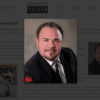Introduction
Here are five things to know about the Center for Public Integrity’s investigation — written by Sarah Kleiner and Chris Zubak-Skees and 15 months in the making — into charities and political committees connected through a Las Vegas telemarketer:
- A growing number of organizations across the country are adopting names that sound like charities, but they’re really political action committees. Examples include the Children’s Leukemia Support Network, the Heart Disease Network of America, the Police Officers Defense Alliance and others. Little, if any, of the money they raise ever goes toward charitable or political causes.
- A Las Vegas businessman named Richard Zeitlin owns companies that have moved from charitable fundraising into contracting with these political committees. Since 2006, his companies have raised at least $121 million for nonprofit charities. Political committees that contract with his companies have raised more than $31 million, according to a Public Integrity review of federal financial disclosures. Of the combined $153 million, Zeitlin’s companies were paid about $133 million, Public Integrity’s analysis shows.
- Some of Zeitlin’s clients have troubled histories. They include a disgraced Florida lawyer, a board member of a charity that was shut down by regulators and an Illinois man with a criminal record. Four of the groups are run by a Las Vegas police officer who was accused in a federal lawsuit in 2018 of using “excessive and unreasonable force” when he shot a man armed with a butter knife six times, killing him.
- In the U.S., it’s legal for charities and political committees to spend unlimited amounts of the money they raise on fundraising. What’s not legal is lying to donors about how their money will be used. It’s up to a patchwork of state and federal investigators to police nonprofits and political committees.
- When a Public Integrity reporter Sarah Kleiner flew to Las Vegas to ask Zeitlin questions in person, he told her to leave his office and threatened to call the police. Then he followed her to the parking lot to get her license plate number.
“My business card is in your office,” Kleiner said. “You have all my contact information.”
“No, no,” Zeitlin said. “You’re coming at me. I’m going to come at you.”
The reporter tried to ask questions, but Zeitlin cut her off and disputed the amount she said he’d raised.
Kleiner asked him to justify his business practices.
“How do you justify bothering me?” Zeitlin said over his shoulder as he turned around and walked away.
Read more in Money and Democracy
Coronavirus and Inequality
Trump’s drug cure for COVID-19 feels like déjà vu
Money and Democracy
They promise to help families of fallen officers. But they’re mostly paying telemarketers.
A union-backed police charity spends just a sliver of its money on those it purports to serve




Join the conversation
Show Comments